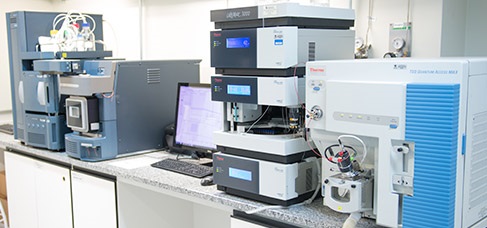The Master’s Degree in Toxicology and Toxicological Analysis pertains to the Pharmacy field of CAPES. It develops advanced studies that aim at offering solutions to issues related to the interaction between chemical substances and different organisms, in various contexts.
Concentration Area : Toxicology and Toxicological Analysis
The central axis of the Master's Degree in Toxicology and Toxicological Analysis is the investigation of adverse effects resulting from the interaction between living beings and products of natural and synthetic origin. In this context, and considering the multiple biological aspects involved in toxicological research, the course has as its particular focus the study of the mechanisms and toxic effects of xenobiotics on living organisms, as well as the identification, characterization and prevention of damages to humans due to interaction with different chemicals.
Goals
- to qualify highly qualified professionals for teaching and research in toxicology and toxicological analysis, emphasizing the articulation with local health institutions and companies.
- to train human resources personnel in the various areas of toxicology and toxicological analysis to act in identifying and solving problems related to the safe use of chemicals.
- to deepen the knowledge about the mechanisms of action and toxic effects of xenobiotics on living organisms and their study models, as well as on the assessment and characterization of human exposure to chemicals and laboratory strategies for their study.
- to produce knowledge in the field of toxicology and toxicological analyzes that contribute to technological innovation, the development of the country and the improvement of health services.
Target Audience
Graduates in Pharmacy, Biomedicine, Biological Sciences, Chemistry, Medicine, Veterinary Medicine and related areas.

AREAS OF EMPHASIS AND PROFESSIONAL PROFILE
The Master's Degree in Toxicology and Toxicological Analysis graduate should be able to:
- Develop teaching and research activities in the area of Toxicology and Toxicological Analysis, interacting with other areas of knowledge;
- Act in the academic and professional environment as a new scientific and technological knowledge generation process promoter in the area of Toxicology and Toxicological Analysis;
- Evaluate different aspects related to the adverse effects caused by chemical substances, in their biological and analytical aspects, particularly their identification and characterization, contributing in a relevant way to the improvement of the population’s quality of life.
- Employ scientific knowledge to solve problems related to the adverse effects caused by chemical substances, particularly human health.
Background
The demand for highly specialized professionals and researchers in the field of toxicology, concern and interest in investing in the training of human resources at the postgraduate level, associated with the existence of human resources and highly qualified materials in the area of Toxicology and Toxicological Analysis at Feevale University led to the proposal of a Master's Degree in Toxicology and Toxicological Analysis, whose proposal was submitted to the CAPES evaluation in the year 2015. The recommendation of the course was given at the 161st Meeting of the Technical and Scientific Council of Education (CTC-ES), held in December 2015. The first selection process of the course took place in January 2016 and the teaching activities began in March 2016.
Feevale University has a consolidated history in the area of Toxicology, and has promoted, in recent years, numerous scientific events, workshops and lectures with leading international researchers in the field of toxicology and toxicological analyzes from international reference centers. Since 2008, the Toxicological Analysis Laboratory of the University has been providing specialized services to the regional and national community, and has been responsible for the determination of cyanide in samples from the Kiss Nightclub fire victims in January 2013 and has provided therapeutic monitoring services for immunosuppressive and anti-infectious agents and specialized toxicological analysis for various medical and forensic centers in the state of Rio Grande do Sul and other centers in Brazil and abroad.
Fields of Research
Experimental Toxicology
This field of research aims to characterize the toxicity of natural, synthetic and nanostructured bioactive compounds, with particular focus on the action mechanisms of these xenobiotics. It also has the objective to evaluate the toxic effects of chemicals through bioindicators, using in vitro and in vivo experimental systems and the study and development of alternative methods for toxicity testing.
Human Toxicology and Toxicological Analysis
This field of research aims to characterize human exposure to chemicals through biomarkers related to the exposure, susceptibility and effects of these substances, as well as to develop laboratory strategies for the detection of xenobiotics in different biological matrices and in non-biological substrates. It also includes toxicology specialties such as therapeutic drug monitoring, biological monitoring, risk assessment and the detection of human exposure to xenobiotics, using different matrices and laboratory strategies.
Coordination committee
Coordinator: Marina
Venzon Antunes.
Substitute Coordinator: Andresa
Heemann Betti.
Teaching Representative: Cristiane Bastos de Mattos.
Teaching Representative: Simone Gasparin Verza.
Teaching Representative (suplent): Ana
Luiza Ziulkoski.
Teaching Representative (suplent): Magda
Susana Perassolo.
Student representative: Juliana Machado Kayser.
Self-evaluation Committee
Teaching Representative: Rafael Linden e Simone Gasparin Verza.
Student Representative: Mariane Tegner.
Egress Representative: Roberta Zilles Hahn.
Admnistrative Technician Representative: Agathe Juliane Erig Sebastiani


